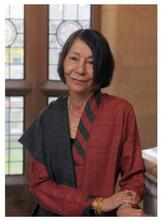In memoriam: Sara Suleri
 Professor of English
Professor of English
Sara Suleri, B.A. Kinnaird College, Lahore, Pakistan, Ph.D. Indiana University, faculty member at Yale between 1983 and 2011, died on March 20, 2022, of pulmonary disease after a long illness. She was sixty-eight. H.M. Naqvi, author of Home Boy, winner of the inaugural DSC Prize for South Asian Literature, reflected after her death that Suleri was “perhaps the greatest Pakistani writer of a generation.” Many would agree.
The book that first caused her to be considered this, and brought her attention and fame, was Meatless Days, the extraordinary memoir of growing up in Pakistan. In nine semi-autobiographical accounts of life in Lahore soon after Pakistan’s partition from India, she interweaves the violent history of the country with poignant stories of her family, against the cultural backdrop of the new nation, and of the losses she, and they, endured. The excellence of the book lies in its portraits, its sense of a life divided between two cultures, and especially the quality of its memorable prose. Few who read it can forget it. The book has become a classic and never been out of print since its publication.
Almost equally influential is Suleri’s book The Rhetoric of English India, in which she focuses on the body of writing produced by the historical relationship between Britain and India and brilliantly takes up the intersection of the two cultures, the influence of their rhetorical strategies, and the complex interplay of imperialism and its aftermath in works by Burke, Kipling, Forster, Naipal, and Rushdie. The book, dependent on a deep understanding of colonial and post-colonial history, is written in Suleri’s distinctive style: dense, concentrated, illuminating. It was considered important at its publication and remains a foundational book in post-colonial studies. Among her other work are two books, Boys Will Be Boys: A Daughter’s Elegy, a memoir of her famous and controversial father, and most recently A Tribute to Ghalib: Twenty-One Ghazals Reinterpreted, co-written with Azra Raza.
Suleri was a strong presence in the English, Literature, and Comparative Literature departments during her years at Yale, an influence on undergraduate students and graduate students alike, a frequent collaborator and co-teacher with other faculty, as well as a founding editor of The Yale Journal of Criticism and a member of the editorial boards of The Yale Review and Transition. She was a riveting lecturer. She had a beautiful voice, and was able slowly, patiently, with great clarity to present her thoughts in sentences longer than most people can manage in speaking. She was brilliant in exposition and deadly in critique. As Paul Fry has said, “Hers was a genuinely mediatory voice, unflinchingly proud yet modulated with the subtlety that only an intense diversity of experience and fastidious mind can enable. Sara Suleri was one of a kind.”